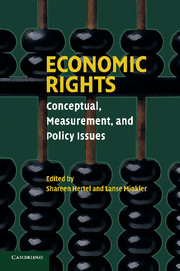Book contents
- Frontmatter
- Contents
- Contributors
- Acknowledgments
- 1 Economic Rights: The Terrain
- SECTION I CONCEPTS
- SECTION II MEASUREMENT
- 7 The Status of Efforts to Monitor Economic, Social, and Cultural Rights
- 8 Measuring the Progressive Realization of Economic and Social Rights
- 9 Economic Rights, Human Development Effort, and Institutions
- 10 Measuring Government Effort to Respect Economic and Social Human Rights: A Peer Benchmark
- 11 Government Respect for Women's Economic Rights: A Cross-National Analysis, 1981–2003
- SECTION III POLICY ISSUES
- APPENDIX 1 Universal Declaration of Human Rights
- APPENDIX 2 International Covenant on Economic, Social, and Cultural Rights
- Index
- References
8 - Measuring the Progressive Realization of Economic and Social Rights
Published online by Cambridge University Press: 18 December 2009
- Frontmatter
- Contents
- Contributors
- Acknowledgments
- 1 Economic Rights: The Terrain
- SECTION I CONCEPTS
- SECTION II MEASUREMENT
- 7 The Status of Efforts to Monitor Economic, Social, and Cultural Rights
- 8 Measuring the Progressive Realization of Economic and Social Rights
- 9 Economic Rights, Human Development Effort, and Institutions
- 10 Measuring Government Effort to Respect Economic and Social Human Rights: A Peer Benchmark
- 11 Government Respect for Women's Economic Rights: A Cross-National Analysis, 1981–2003
- SECTION III POLICY ISSUES
- APPENDIX 1 Universal Declaration of Human Rights
- APPENDIX 2 International Covenant on Economic, Social, and Cultural Rights
- Index
- References
Summary
In order to give the principles articulated in the Universal Declaration of Human Rights greater authority and strength, the United Nations drafted a Covenant on Human Rights. The ensuing debates as to whether economic and social rights are of the same character as civil and political rights resulted in two separate and overlapping documents: The International Covenant on Economic, Social, and Cultural Rights (ICESCR), and the International Covenant on Civil and Political Rights (ICCPR). Although civil and political rights have gained widespread recognition as human rights, there is still substantial disagreement among Western scholars and political leaders over whether social and economic rights are “rights” or goals. The division between the two treaties and the primacy given to political rights has “ever since hovered like an albatross over the development of human rights protection” (Scott 1999).
The debate over the authenticity and legitimacy of economic and social rights has slowed the collection of adequate measures of economic and social rights indicators. Adequate measures are critical in obtaining an overall picture of the realization of these rights and in assessing their progress over time. The development, collection, and presentation of economic and social measures can increase the political and legal accountability of states to fulfill their treaty obligations. Furthermore, statistical measures can provide the evidence necessary to substantiate legal claims, thus rendering void the assertion that economic and social rights cannot be adjudicated in a court of law, and consequently are not legitimate rights.
- Type
- Chapter
- Information
- Economic RightsConceptual, Measurement, and Policy Issues, pp. 165 - 181Publisher: Cambridge University PressPrint publication year: 2007
References
- 6
- Cited by



